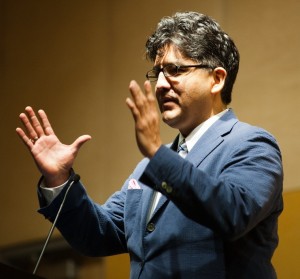 I totally deserved it.
Some background. First of all, getting to hear Sherman Alexie speak is a privilege for anybody because he's a supremely talented speaker. It's a bigger deal for me because he's in my Top Ten. Those aren't the ten writers I enjoy reading the most, though I thoroughly enjoy reading Mr. Alexie's work. Saying he's one of my favorite writers, though true, feels too much like saying, "I'm on Team Sherman!" Bleck. No, my Top Ten are the writers whose work I respect the most because they are masters of their craft. The roster of the Top Ten sometimes changes, but he's been a consistent member since I was 17 and read The Lone Ranger and Tonto Fistfight in Heaven. Some of the other writers are dead. Some are alive, but recluses, like Cormac McCarthy, so I don't expect I'll get to hear them speak anytime soon. One member is dead and he was an asshole, so I'm not sure I would even have wanted to hear him speak. I might be paraphrasing, but I think Stephan King said something about how Earnest Hemingway was an asshole, but he was also a motherfucking genius. If Hemingway asked me to go out drinking with him I would demure because I know he would get me drunk, challenge me to a boxing match, impugn my masculinity until I agreed, and then beat the tar out of me. On second thought, I would still say yes and be grateful to have the chance to be beaten up by Hemingway. On third thought, I'd say no because I'd be too creeped-out if a dead guy asked me to go drinking. Nah, I'd still say yes.
I totally deserved it.
Some background. First of all, getting to hear Sherman Alexie speak is a privilege for anybody because he's a supremely talented speaker. It's a bigger deal for me because he's in my Top Ten. Those aren't the ten writers I enjoy reading the most, though I thoroughly enjoy reading Mr. Alexie's work. Saying he's one of my favorite writers, though true, feels too much like saying, "I'm on Team Sherman!" Bleck. No, my Top Ten are the writers whose work I respect the most because they are masters of their craft. The roster of the Top Ten sometimes changes, but he's been a consistent member since I was 17 and read The Lone Ranger and Tonto Fistfight in Heaven. Some of the other writers are dead. Some are alive, but recluses, like Cormac McCarthy, so I don't expect I'll get to hear them speak anytime soon. One member is dead and he was an asshole, so I'm not sure I would even have wanted to hear him speak. I might be paraphrasing, but I think Stephan King said something about how Earnest Hemingway was an asshole, but he was also a motherfucking genius. If Hemingway asked me to go out drinking with him I would demure because I know he would get me drunk, challenge me to a boxing match, impugn my masculinity until I agreed, and then beat the tar out of me. On second thought, I would still say yes and be grateful to have the chance to be beaten up by Hemingway. On third thought, I'd say no because I'd be too creeped-out if a dead guy asked me to go drinking. Nah, I'd still say yes.
Anyway, back to a member of the Top Ten who is less likely to beat me up (I'm still wary of you, Margaret Atwood!). I've heard Mr. Alexie speak before at the Portland Arts and Lectures series, but I didn't ask a question. I told myself that I was letting the high school students have that opportunity, but really I was too star struck. Tonight, I girded my loins and jumped for the mic when the time came.
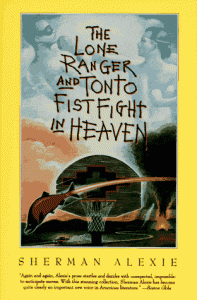 Then, like a douche, I tried to make a joke about how I was still reeling from the news that this is the 20th anniversary of The Lone Ranger and Tonto Fistfight in Heaven, a book I read when I was 17. I wanted to explain that the book was hugely important to me because it was one of the first things I'd read that taught me that good writing can punch you in the gut. Up until then, I'd read classics without the ability to put myself into another time and place and fully feel how impactful they were to the audiences of their day. I also read a lot of fantasy and sci-fi that were wonderful, but which were largely vacations from my life, not books that openly challenged me. (That's not a knock on fantasy or sci-fi. I just hadn't yet found books like 1984 or The Year of the Flood that pack a wallop.) Somebody put The Lone Ranger and Tonto Fistfight in Heaven into my hands when I got to college (some friend in the dorm, not one of my profs. It was too new to be canonized yet) and I found that short fiction and poetry, especially the poetry, could knock the wind out of me. I thought Mr. Alexie might take particular pleasure in the knowledge that his writing delivered a beat-down to a suburban white kid, but he'd also appreciate that it carried his images into my classroom, into my own writing, and into crevices in my brain where they have resided for twenty years and show no signs of vacating.
Then, like a douche, I tried to make a joke about how I was still reeling from the news that this is the 20th anniversary of The Lone Ranger and Tonto Fistfight in Heaven, a book I read when I was 17. I wanted to explain that the book was hugely important to me because it was one of the first things I'd read that taught me that good writing can punch you in the gut. Up until then, I'd read classics without the ability to put myself into another time and place and fully feel how impactful they were to the audiences of their day. I also read a lot of fantasy and sci-fi that were wonderful, but which were largely vacations from my life, not books that openly challenged me. (That's not a knock on fantasy or sci-fi. I just hadn't yet found books like 1984 or The Year of the Flood that pack a wallop.) Somebody put The Lone Ranger and Tonto Fistfight in Heaven into my hands when I got to college (some friend in the dorm, not one of my profs. It was too new to be canonized yet) and I found that short fiction and poetry, especially the poetry, could knock the wind out of me. I thought Mr. Alexie might take particular pleasure in the knowledge that his writing delivered a beat-down to a suburban white kid, but he'd also appreciate that it carried his images into my classroom, into my own writing, and into crevices in my brain where they have resided for twenty years and show no signs of vacating.
Of course, by pointing out that the twentieth anniversary made me feel old, I couldn't help but imply that Mr. Alexie is even older. So, before I could try to shoehorn all that praise into a short preamble to my real question, he said, "Fuck you!"
Now, this was great for a couple reasons. For one thing, I'd brought a group of my high school students. They absolutely loved watching a great writer tell one of their teachers off. On the bus on the way home, they kept asking, "Can we tell people what he said to you in school tomorrow?"
I shrugged. "You'd be quoting, so I guess it's fine as long as you put it in context and cite your source. Always cite your sources."
 The other reason why this was so great was because it was Sherman Alexie and he was saying it to me. A couple weeks ago, as a fluke, I had my name drawn out of a hat and had a chance to go meet a couple of the Portland Trailblazers. It wasn't just a handshake/signature affair. We got to participate in a mock practice. Their great new center, Robin Lopez, who is listed at seven feet tall but struck me as more like eight, was kind enough to swat one of my attempted layups into the stands. That's what this felt like. Having Sherman Alexie tell me, "Fuck you!" was like having an NBA player swat my weak shot into the stands.
The other reason why this was so great was because it was Sherman Alexie and he was saying it to me. A couple weeks ago, as a fluke, I had my name drawn out of a hat and had a chance to go meet a couple of the Portland Trailblazers. It wasn't just a handshake/signature affair. We got to participate in a mock practice. Their great new center, Robin Lopez, who is listed at seven feet tall but struck me as more like eight, was kind enough to swat one of my attempted layups into the stands. That's what this felt like. Having Sherman Alexie tell me, "Fuck you!" was like having an NBA player swat my weak shot into the stands.
It didn't register at first. I'm not particularly prurient when it comes to language. Words are tools. They have no moral weight. When the right tool for the job is a four letter one, then it should be used. When any word, no matter how innocuous it might seem out of context, is employed to hurt someone, it becomes a "bad word." Even then, sometimes a bad word is also the right word. This casual attitude about so-called "swear words" is a bit dangerous for a school teacher. After listening to Mr. Alexie speak, I almost said that the revelation about the book's age made me "feel fuckin' old," and that would have been a bad slip-up in front of my kids. (They would have loved it, but I probably would have gotten hell from a parent or two.) When Mr. Alexie said, "Fuck you!" I not only wasn't offended; I was relieved. Standing up in front of a room full of people might be de rigueur for him, but there were a lot more grown-ups in that room than I am used to, and he made me feel like we were just two guys talking. Sure, he's the literary equivalent of an NBA seven footer and I'm the literary equivalent of ...well, I have one novel published, so I guess I'm the literary equivalent of the fan who jumps out of his recliner to shout at the TV sometimes. Still, he was talking with me, and that was very cool.
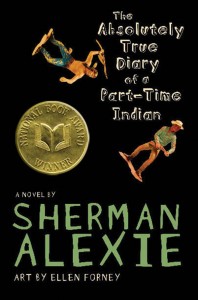 After that, I stumbled my way through my question. He used to stutter, so that's probably why he was patient with me. I asked him about how difficult it was to edit the beginning of The Absolutely True Diary of a Part-time Indian, a description of poverty and its psychological effects that is so carefully crafted and effective that I think every politician and policy-maker should have to read it to even be considered for office.
After that, I stumbled my way through my question. He used to stutter, so that's probably why he was patient with me. I asked him about how difficult it was to edit the beginning of The Absolutely True Diary of a Part-time Indian, a description of poverty and its psychological effects that is so carefully crafted and effective that I think every politician and policy-maker should have to read it to even be considered for office.
"Where do you teach?" he asked.
Now that really freaked me out. After all, this was a guy who had just said, "Fuck you!" and if he didn't like my question and had decided to light me up, I was about to give him a huge opening.
I told him. "Wow," he said. "They have some good teachers at Central High School." This is true. I'd ridden on the bus with some teachers who are better than I am. But I got the impression he was talking about me, and I will accept that praise (uncomfortably, as always).
Then he answered my question. His answer was generous, too generous for me to recount completely. He said that he'd edited that particular portion of the book probably 50 times. Then he demonstrated how one finds that sweet spot where a story manages to hit home without being preachy. You read that correctly. He demonstrated. On the spot. He told a story about the time his family got their first toilet. They didn't have indoor plumbing before, and, when they got it, it was magical. He had us all laughing as he talked about the mythic men from Sears who carried it in, and how the family drew straw to see who would get to use it first. He was the first Alexie to use the first Alexie toilet. Once he had us all feeling amused and included, he showed how the story can pivot in a natural way, grab us by the guts, and twist. He told us about how, when he was little, he was so scared that his dad would disappear on another bender that, when his dad would go into that bathroom to sit on that toilet, Sherman Jr. would go down the hall and sit by the door, knocking, just to make sure his dad was still home.
Bam! That's how it's done.
After demonstrating, he reminded us all that a lot of the editing process comes from reading. That was a good reminder for this English teacher. I always tell students how important it is to read often in order to become a better writer, but I forget to tell them that they need to read in order to become better editors, to analyze their own work and measure it by what has been successful in the writing they enjoy. I will make a point to share that with the students in my creative writing class tomorrow, though I know I won't do so half as well as Mr. Alexie did tonight.
To sum up, iIn just one evening, Mr. Alexie made me a better editor, a better writer, and a better teacher (and probably a better father, a better liberal, and a better white person, if I'm totally honest). To him, that's probably just like every other fucking day, but, to me, it was one helluva night.
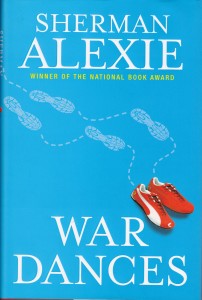 But I didn't get to tell him how much I loved War Dances.
But I didn't get to tell him how much I loved War Dances.
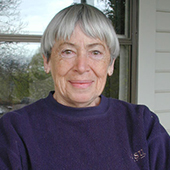 For those of you who are unfamiliar with her work, Ursula K Le Guin is probably most famous for her novels Lathe of Heaven and The Left Hand of Darkness, as well as her Earthsea fantasy series. She's won the Hugo Award twice and the Nebula Award four times (those are the biggest prizes for science fiction authors). She's won the National Book Award. Tonight I learned that the Library of Congress named her a "Living Legend" for her contribution to American literature. Not too shabby.
For those of you who are unfamiliar with her work, Ursula K Le Guin is probably most famous for her novels Lathe of Heaven and The Left Hand of Darkness, as well as her Earthsea fantasy series. She's won the Hugo Award twice and the Nebula Award four times (those are the biggest prizes for science fiction authors). She's won the National Book Award. Tonight I learned that the Library of Congress named her a "Living Legend" for her contribution to American literature. Not too shabby.





